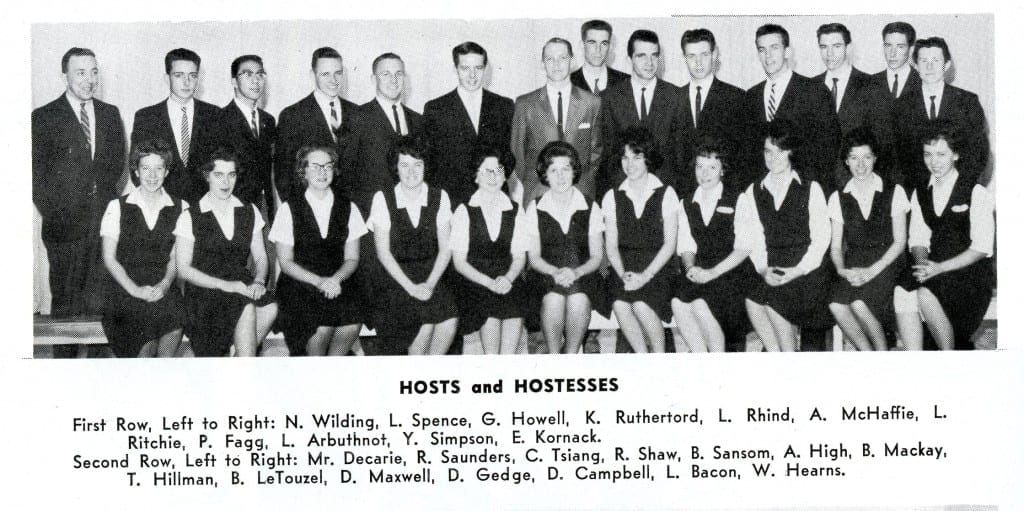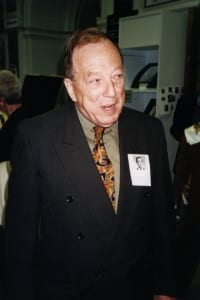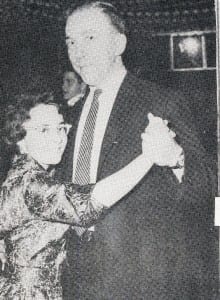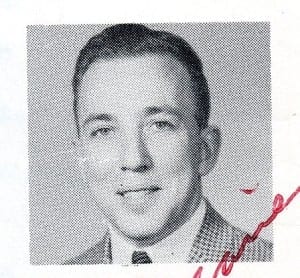“Whenever I have a spare moment,” notes Graeme Decarie, “I write a bit about my life for my children.”

Graeme Decarie is at the far left in back row. Photo from 1961-62 MCHS yearbook. Click on image to enlarge it. Click again to enlarge it further.
In an email on Dec. 18, 2015, Graeme Decarie wrote:
Whenever I have a spare moment, I write a bit about my life for my children. Last night, I started one that is really about failure in school – and why and how I failed. It’s something that has a lot to do with social background, which was also true of students at MCHS.
As I started it, it was a history of my friends starting with Stanley at age 5. And it gets into my period of shoplifting and school-duking – and failure. And a major turning point of doing a day of supply teaching at a school in St. Laurent. Can’t remember the name of it. It was on the St. Laurent side of the railway tracks, and near Canadair.
The following story is from Graeme Decarie; I am pleased I have the opportunity to share it with you:
Stanley Short
The first friend I am aware of was Stanley Short. I was five at the most. He and I would play in a vacant lot, sometimes wandering over a few streets to an abandoned basement intended for a theatre that was never completed. (These were Depression years.) All kids in the district played in the streets from age five and younger, and without supervision of any sort. The only time my mother intervened was when she looked out the window and saw Stanley and I pointing a finger at each other and shouting “Pow! Pow?”
It was Sunday, and we were playing cowboys. She came down, hauled me in by the ear, and spanked me.
On the first day of school, I took a seat at the back of the class. Miss Rose called me to sit right in front of her desk. (Years later, an elderly Miss Rose would tell me she did it because I looked so tiny and innocent in a very rough class.) One of the very tough and rough ones was Stanley. As I passed his desk on the way up, he muttered, “Teacher’s pet.” In our Sunday school class when I won a book of Bible stories for a prefect record of memorizing the scripture for the week, Stanley muttered, “Lucky bugger.”
And it was always said with a bitter threat implied.
Stanley grew up to be very, very powerful. Loved fighting. And became something of a thug. But we had long since drifted apart.
George Root and Gerry Smith
By grade 2, I was tight friends in George Root and Gerry Smith. Gerry Smith was very rich. His family lived in a real house with a back yard and everything. And, on a nice, summer day, his father made so much money he could rent a car to take the family for a drive.
Behind Gerry’s house was a row of trees and bush and, beyond that, the Hugh’s farm and the old rock quarry that was the city dump. We often played in the dump. When I was, perhaps, twelve, Gerry got the idea of us building a clubhouse in that line of trees. So we stole lumber and nails and stuff from a nearby building project and built a clubhouse. To celebrate the official opening, we shoplifted a cake and some cigarettes. A good time was had by all.
Romeo Sevigny
Mixed in, often, was Romeo Sevigny, a con artist. He taught me to steal dimes from my mother’s purse so I could buy model airplane kits, and we could make them together at his house.
I never saw any of them after age 14 because they all left school in that year. George Root, illiterate, became a railway policeman. I don’t know about the other two.
Grade 9
For grade 9, I had to move to the high school for our district. It was much the same as my grade 8 class with a mix of Italians, Syrians, a couple of Greeks. I was placed in Room 22, the room for the smart kids. Some actually finished high school. And two of us got doctorates. But, oh, they were a wild bunch.
One day, we locked the doors from inside so the teachers couldn’t get in. Then we sang songs, smoked cigarettes, and held small kids out the second floor windows by their feet. On another day, two of the boys stole a doctor’s bag complete with hypodermic needles and liquid chemicals of some sort. At lunch hour, in the classroom, they grabbed a Syrian kid, Junior Aboud, and pulled down his pants to stick a loaded needle into him. The teacher on lunch duty came just in time to stop them.
That’s when the police came.
Jack Herbert and Doug Masson
My best friends in the class were Jack Herbert and Doug Masson. Jack’s mother was a prostitute, and his father an ardent communist. Jack was smart and tough and ambitious – and more than a little shady. He left school after grade eleven to sell motorcycles, largely to gang members. He was soon owner of the biggest motorcycle shop in Montreal, and a close friend of the major gang members for whom he laundered their drug money. He then retired early to live on his yacht in the Meditteranean.
Doug Masson remained a close friend into my twenties. He was an odd guy with severe delusions about himself. He also got heavily into booze in his twenties; that’s when he told me about the bird that used to come to sit at the foot of his bed and talk to him. But he got over that.
Mr. Doak
And I really should mention by grade 9 teacher. Mr. Doak was the finest teacher I ever saw. Many years later (I was with my daughters, Catherine and Christina) and I saw him in a restaurant. I went over to talk to him. But he didn’t remember me. Shortly after, I published a story about how highly I thought of him. It was noticed by somebody at the school board who reprinted it in the teachers’ journal. Mr. Doak’s son read it to him, just hours before he died.
Montreal High
Then I went to Montreal High (not long after Christopher Plummer and jazz pianist Oscar Peterson had graduated). Again, I was in the elite class but, oh, I had never been in a class like that before. They were all bright, some brilliant, about half were Jewish, and they all spoke of going to university as though it were the most natural thing in the world.
I’m still in touch with some of them. Yosh Taguchi became a doctor whose research brought McGill a five million dollar bursary. This was achieved by a kid who had grown up in a concentration camp because he was a Japanese-Canadian. Yosh and I became very good friends. I worked with him to get an apology from the Canadian government for the internment of the Japanese; and the Japanese community picked me and Yosh to be the speakers when a cabinet minister came to Montreal to apologize.
Phil Shaposnick became a highly innovative lawyer. He turned law into a process of ending disputes rather than penalizing.
Bob DeJong got me off cowboy stories, and into reading really good books. He also converted me to socialism (though he would later become a ruthless capitalist.)
Turning point
That year was the turning point of my life though, at the time, it felt like my terminal decline.
I liked my classmates. And I got into serious reading and serious discussion. But I had never had friends like them before. Among the kids I had grown up with, finishing high school was almost unheard of. I remember meeting an older kid when I was 12 or 13. He had finished high school. And everyone looked on him as a god. But, with these new friends, high school was just a casual step on the way. And they talked about plays and they understood all kinds of things about theatre and movies.
I was out of place.
At the time, we made a big move up the ladder – and I guess that was disorienting. We rented one of those fancy apartments on a new street called Barclay Ave. near Decarie. It had running hot water, a fridge, a shower, a real stove for cooking, an oil heater in the hall and – oh, just everything. For the first time in my life, I had a real bed and my own room. It was really splendid – but I didn’t know a soul.
Grade 10
I guess all that is why I started skipping school. I’d go downtown, but I’d spend my days in the natural history museum at McGill looking at the dinosaur bones and the stuffed gorilla and the mummies all wrapped in cloth. I liked the Montreal Art Gallery, too, and there was a great antique store on Sherbrooke. So I failed grade 10. My parents weren’t upset. Failure was accepted as normal. So I repeated. Again, I was in a class with smart kids that I liked but couldn’t relate to. So I skipped a lot, again. But second time was easier, and I passed into eleven.
Grade 11 still left me feeling an outsider. It was about Easter that principal Unsworth called me down to his office.
“Let’s face it, Decarie, you have no brains at all. It’s time to get out and look for a job.”
My parents took it in stride. I guess that was because I was already the best educated person in the history of the family. So I went to work at what was then the Bell head office on Beaver Hall Hill as mail clerk, then a printer, then the guy who ran a machine that stuffed phone bills into envelopes, and tied them into bundles. The Bell was not impressed, and in my fourth year I realized my days were numbered. But this time I was lucky.
Sir George
I had (sort of) finished high school at Sir George in evening courses. Most of them were Mickey Mouse courses like public speaking, and I got straight Ds. But it was high school, sort of. Somehow, Sir George accepted me for the university – which was surely a blunder on somebody’s part. I never heard of anybody getting into university on a record like mine.
And, in another burst of luck, I had been working with a kid’s group at Central Y. The Y offered me 40 dollars a month to work just 40 hours a month while training to be a YMCA director. I grabbed it. And they assigned me to Northmount Branch in St. Laurent. I was there for two years, and enjoyed it so much I skipped classes, and ran lots of Ds (including a D- in Canadian history) and some Fs, and some ‘Did Not Complete’.
Supply teaching starting with a school nor far from Malcolm Campbell High School
It was my second year when the next big break came. Short of money, I occasionally was a supply teacher, starting with a school [Morison School, as we have subsequently learned] not far from MCHS. It was the other side of the tracks from MCHS and close to Canadair. I discovered that I loved teaching. So I applied to Macdonald College for teacher training. It was just one school year and, with a summer job, I could afford the fees.
They accepted me then, in the first month, they discovered I had never really finished high school. Luckily, they decided to count my university courses as high school credits. And I actually went to classes at Mac. (There was nothing else to do that far out of town.) I finished with soaring grades that averaged close to C. And so I was offered a job at Parkdale. Grade 7.
Parkdale
I can still see that class, each in his or her own seat. I had found what I wanted to do with my life, and I shall never forget that class. Many of them were in the MCHS graduating class of 1963.
I taught at Parkdale for three years while finishing a BA at night. But I still felt an outsider. I really didn’t know much, and my BA grades were so bad, the university wouldn’t even give me a major, though I had all the courses for one.
But the BA got me to Malcolm Campbell. That confirmed it. I really knew what I wanted to do with my life. But it wasn’t quite enough.
Ever since grade 10, I had begun hanging out in Jewish circles. I was drawn, I guess, by their sense of respect for learning, and their commitment to social progress. (Many of the parents had been active communists who quit the party when they learned what the Soviet Union was about. I found the old Jewish communists gentle and caring people – qualities not nearly so evident in gentiles.) While I was teaching at MCHS, I got involved in the nuclear disarmament movement in a group that was almost all Jewish. I also worked for the YMHA, which I found to be intellectually stimulating. I ran a couple of YMHA summer camps. One of my campers was Raizie Kurtzman who was in 11D in 1963.
As a result, I guess, I felt compelled to learn more. But when I showed my grades to a McGill prof, he sniffed and said, “These grades are beneath contempt.”
Acadia
So I took a summer course at Acadia in the summer of 1962. To my amazement, I now found it easy to study, and I got an A. Next summer, I took another course. Another A.
I returned to MCHS for September of 1963. But I realized early on the first day that it was now or never. So I told Jack Leroy I quit, got into my car, and drove back down to Wolfville, Nova Scotia. The next morning, after driving all night, I presented myself to the Dean, and said I wanted to do an MA. He looked troubled. “Well, maybe if you did another full undergrad year and got straight As…”
So I registered for another undergrad year, and found a room in a farmhouse at five dollars a week. My landlady was an elderly, very stout and very strange lady, Mrs. Herbert D. Johnson. She used to clean her girdle by boiling it in a cooking pot on the stove, filling the house with a noticeable aroma. Once, she bellowed to me from the bathroom, “Mr. Decarie! You come in here – with your eyes closed.”
She was stuck in the tub, and needed me to pull her out.
Some years later, I wrote a story about her, and sold it for enough to pay me back the rent and all my living expenses for two years with her.
Queen’s
But I got the year done with straight As, then did the same for the MA. And that got me into Queen’s on a scholarship for the Ph.D. From that point on, things like radio and TV and film just fell into my lap.
I liked university teaching. I liked some profs though, in general, I preferred teaching high school, and I preferred school teachers. I found many profs self-worshipping and prestige-seeking. And most were bad teachers. In my years at Acadia and at Queen’s, I knew only one prof who had a clue how to teach.
In the process of finding my way, I learned a lot about why some kids do well in school, and some do badly. Along the way, I learned at Parkdale, MCHS, UPEI, and Concordia how to teach and how to learn. I’m happy that I did.
And I’m grateful to some people from Parkdale and MCHS who read this because they taught this teacher how to teach. And that turned out to be a great life, and one that I shall always miss.
[End of text from Graeme Decarie]
Comment
I’m really pleased that I promised, in a recent email, that I would post Graeme’s text at once. I wanted to follow through on my promise. Sometimes I get lazy, or at least like to take a break, but in this case I got right to work. Before I posted Graeme’s text, I also posted an earlier text that Bob Carswell had sent. I’m really pleased I had the opportunity to post Bob’s text as well.
Update
The above-noted post has given rise to additional comments on Facebook:
Charles Tsiang notes on Facebook: Seems like Bill Sansom and I are the only ones from this group that I’m with connecting with on Facebook. Wondering if there are others in touch.
Jaan Pill notes on Facebook: I know that during the planning for the MCHS 2015 Reunion, Lynn (Hennebury) Legge had a good phone conversation with Barclay Allan (MCHS 1963) in Pentiction, B.C. (as I recall) who is married to Lynda Spence (MCHS 1962).
Which reminds me in turn of this 1950s online photo – Cartierville Boating Club – Canadian Champions 1957.
The Quebec Juvenile Football League comes to mind with regard to Barclay Allan’s (sometime spelled Allen) Canadian Football League career.
Of related interest is an online overview of Barclay’s football career.
Now the memory comes back. I remember in football games that we played in Grade 4 in the 1950s at Cartierville School at recess, Barclay Allan was often the quarterback. He did a great job at finding people who were in the clear. I vaguely recall catching the ball from him in the end zone or close to it on a few occasions. That plus preparing snowballs for an older student, Norman Alamo, to throw during epic snowball battles between two snowball teams, are among the memories that have stayed with me from my one year at Cartierville School. (I’ve also come across memories, from at least one other student (in a comment from Yvonne; see link below) from those years, that on some occasions the school administration clamped down on the throwing of snowballs.)




It’s even worse when I enlarge the photo. I didn’t recognize anybody, not even Bill Sansom whom I knew very well. I couldn’t recognize Lynda Spence whom I had known since grade 7. And there’s a P. Fagg who looks at lot like D. Fagg.
It looks like the P. Fagg is a typo in the 1961-62 MCHS yearbook. On a Macbook Pro laptop, the enlargement of the image works well. It’s good for me to know, from your experience, that the enlargement function does not work at all well, at times, with other systems.
What I will do is I will put together an 8 x 10 printout of the photo, on photo paper, and send it to you via Canada Post. The great thing about technical problems is that usually there are technical solutions. What matters most of all is the stories that you have shared at this blog post, and that so many people have read with much so much interest.
I’ve been looking for Lynda Spence and Barclay Allan for years. I lived with Lynda and her family for the last month of school, in 1963. My parents had already moved to Brampton, ON, so Lynda was very gracious to let me stay with her and finish high school, in Quebec.
I look forward to knowing that, one way or another, you will be able to touch base with Lynda and Barclay again. They are out in B.C.